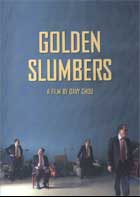
Golden Slumbers 2011
Distributed by Icarus Films, 32 Court St., 21st Floor, Brooklyn, NY 11201; 800-876-1710
Produced by Jacky Goldberg
Directed by Davy Chou
DVD, color, 96 min.
Sr. High - General Adult
Asia, Cambodia, Films, Genocide, Human Rights
Date Entered: 08/21/2014
Reviewed by Cliff Glaviano, formerly with Bowling Green State University Libraries, Bowling Green, OHBetween 1960 and 1975 around 400 feature length films were made in Cambodia. Phnom Penh alone had more than 30 movie theaters. When the Khmer Rouge came to power in late April, 1975, movies were banned and most film producers, filmmakers and actors were executed as enemies of the people. Targeting politicians and bureaucrats, the well-to-do, professionals, and the educated, the Khmer Rouge exterminated some 1.7 million of an estimated 7 million living in Cambodia in 1975. From the golden age of the Cambodian film industry only a handful of films survive today, with most in poor condition. A significant portion of Cambodia’s cultural heritage has been lost, now remembered by aging film buffs and a very few surviving film producers, directors and actors. Golden Slumbers is in Khmer or French with English subtitles.
Filmmaker Davy Chou interviews directors Ly Bun Yim, Ly You Sreang, and Yvon Hem, and actress Dy Saveth who survived either through the luck of having been out of Cambodia during the takeover or by having made perilous escapes from rural Khmer Rouge work/reeducation camps. Essentially, Khmer cinema exists in a few reels of film, bits of damaged film and photographs, lobby cards, posters and audio tapes of radio ads. Aside from the memories of these surviving filmmakers, some older residents of film location sites and a few film buffs, these tattered remains are all that is left of a thriving Khmer film culture, excepting a strong presence of film song in today’s karaoke clubs. Theaters that thrived in the 1970s have been destroyed, remodeled into karaoke clubs, or serve as living quarters for urban squatters, the largest home to 116 families.
This video is recommended for those interested in film studies, more importantly for those who have an interest in the far reaching effects of the Khmer Rouge genocide. It is apparent from the themes of the films that are discussed and remembered that Cambodian film dealt heavily with the lives and traditions of Cambodian society and very much celebrated retelling and enhancing Khmer mythology. Great personal and cultural loss is seen through the eyes of the survivors and the memories of film fans. The loss is more profound since the Khmer Rouge systematically destroyed films and film archives, not leaving much more than a weak oral tradition. The cultural devastation that the film industry underwent after 1975 is paralleled in the dismantling of the Cambodian court dance culture described in the video Dancing Through Death (reviewed in EMRO) describing the outlawing of performance and teaching of traditional dance under threat of execution by the Khmer Rouge.